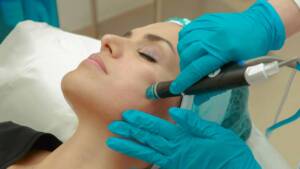 Hyperpigmentation—those stubborn dark spots, uneven patches, or overall skin discolouration—is one of the most common concerns among individuals with Indian skin tones. Due to higher levels of melanin, Indian skin is more prone to pigmentation issues triggered by sun exposure, hormonal fluctuations, acne scars, and even lifestyle habits.
Hyperpigmentation—those stubborn dark spots, uneven patches, or overall skin discolouration—is one of the most common concerns among individuals with Indian skin tones. Due to higher levels of melanin, Indian skin is more prone to pigmentation issues triggered by sun exposure, hormonal fluctuations, acne scars, and even lifestyle habits.
At Rx Rejuvenate, we believe in educating our clients about their skin so they can make informed decisions about prevention and treatment. Here’s a complete guide to understanding hyperpigmentation in Indian skin and the best ways to address it.
What is Hyperpigmentation?
Hyperpigmentation occurs when excess melanin—the pigment that gives skin its colour—is produced in certain areas, leading to darker patches. It can appear as:
-
Melasma: Symmetrical brown or grey patches, often due to hormones or sun exposure.
-
Post-Inflammatory Hyperpigmentation (PIH): Dark marks left behind after acne, cuts, or skin irritation.
-
Sunspots (Lentigines): Flat, brown patches caused by prolonged sun exposure.
-
Freckles: More common in lighter skin tones but can appear in sun-sensitive Indian skin as well.
Common Causes of Hyperpigmentation in Indian Skin Tones
-
Sun Exposure – UV rays stimulate melanin production, causing tanning and uneven pigmentation.
-
Hormonal Changes – Pregnancy, PCOS, and birth control pills can trigger melasma.
-
Acne & Skin Injuries – Indian skin often leaves behind dark marks after pimples or cuts.
-
Genetics – A family history of pigmentation can increase susceptibility.
-
Lifestyle Factors – Stress, lack of sleep, smoking, and poor diet can worsen pigmentation.
Prevention Strategies
While some pigmentation is unavoidable, consistent skincare and lifestyle habits can greatly reduce its severity:
-
Daily Sunscreen Use: Broad-spectrum SPF 30+ is crucial, even indoors.

-
Protective Accessories: Hats, sunglasses, and scarves help minimise direct sun exposure.
-
Gentle Skincare: Avoid harsh scrubs and aggressive treatments that can inflame the skin.
-
Balanced Diet: Foods rich in antioxidants (berries, leafy greens, nuts) help fight free-radical damage.
-
Stress & Sleep Management: Adequate rest and stress control support overall skin health.
Treatment Options for Hyperpigmentation
At Rx Rejuvenate, we offer a combination of medical-grade treatments and lifestyle guidance to treat pigmentation safely and effectively.
1. Topical Treatments
-
Prescription creams with hydroquinone, kojic acid, azelaic acid, or retinoids help lighten pigmentation.
-
Vitamin C serums brighten skin and protect against oxidative stress.
2. Chemical Peels
-
Glycolic acid, salicylic acid, or TCA peels exfoliate the top layer of skin, reducing dark spots and evening tone.
3. Laser Therapy
-
Advanced laser treatments target melanin deposits without damaging surrounding skin.
-
Especially effective for sunspots and resistant pigmentation.
4. Microneedling with PRP
-
Stimulates collagen and accelerates healing, improving post-acne pigmentation and overall texture.
5. Medical Facials
-
Customised facials with brightening serums and hydrating boosters enhance treatment results.
Why Indian Skin Needs Specialised Care
Indian skin has more melanin activity, which means aggressive treatments can sometimes worsen pigmentation if not done correctly. That’s why it’s important to seek care from trained professionals who understand ethnic skin and can tailor treatments accordingly.
Final Thoughts
 Hyperpigmentation can be frustrating, but with the right prevention and treatment, clear and even-toned skin is achievable. A combination of consistent sun protection, targeted skincare, and professional treatments can dramatically improve pigmentation issues.
Hyperpigmentation can be frustrating, but with the right prevention and treatment, clear and even-toned skin is achievable. A combination of consistent sun protection, targeted skincare, and professional treatments can dramatically improve pigmentation issues.
At Rx Rejuvenate, we specialise in safe, effective solutions for Indian skin tones, helping our clients restore their natural radiance.
Book Your Skin Consultation at Rx Rejuvenate
Clinic Address:
207, Basement, Landmark Union Bank, Old Gupta Colony, Kalyan Vihar, Delhi, 110009
Call or WhatsApp: +91 7303160666
Email: [email protected]

